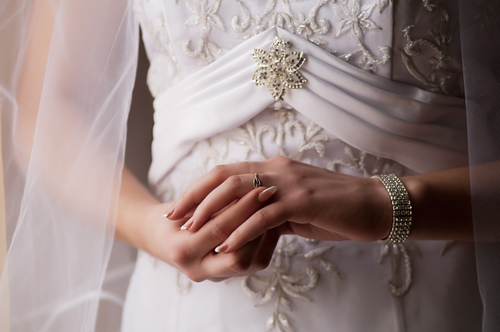 Last week I received an email from a reader who identified herself as an 18-year-old Mormon dating a guy who’s nominally Greek Orthodox.
Last week I received an email from a reader who identified herself as an 18-year-old Mormon dating a guy who’s nominally Greek Orthodox.
“I know 18 sounds crazy to be talking about marriage, but it was a topic over a dinner date and now we talk about it every now and then,” she wrote. She wanted to know how my husband and I make our Mormopalian marriage work:
. . . I’m just curious. Who married you? Since most marriages are done by a religious authority in any religion, who did yours? I’ve seen marriages that are done by the LDS bishop, but never really anything else when it comes to a part-member family. My most important concern, if your parents are members (which I’ve read a few of your articles and it sounds like they aren’t), how did you get them to support you in your decision to marry someone of a different faith than you?
I get variations of these marital questions from time to time; in fact, they’re among the most common personal queries I receive through the blog.
This tells me something – not that my own marriage or life is so interesting, but that the Church is providing very little in the way of resources for anyone thinking of marrying outside its ranks.
The LDS Church strongly encourages Mormons to only date other Mormons, and certainly to only marry inside the fold (though as Naomi Schaefer Riley points out in her terrific book on interfaith marriages in the USA, Mormons also do a great job of fellowshipping interfaith families once a wedding has already occurred).
So, “H,” here’s my advice to you after 23 years of happy marriage to a Protestant:
Yes, a beautiful marriage is very possible for you.
But first, some conditions.
1) Talk, talk, talk. You’re right that 18 is crazy to be getting married, but I don’t think it’s crazy for you to be talking about it. In fact, talking about it is one of my conditions. Interfaith marriages work best when you can’t stop talking to each other about the wonderful stuff as well as about potential sources of conflict – in this case, religion.
Riley’s research shows, though, that most people who are exploring interfaith marriage focus almost solely on the wedding, which is just one day: Who will do the ceremony? Will we merge customs from both traditions? Etc. I see a bit of this in your question to me. (And in answer to your specific question about my wedding, I wasn’t Mormon when I got married, so we had a Protestant candlelight ceremony.)
Focus on the marriage, not the wedding. Which brings me to my second point . . .
2) Expect some loneliness. Mormons have the lowest rates of intermarriage of any other religion in America. In America more generally, about 1 in 3 marriages is now interfaith; for Mormons it’s only about 1 in 9. That’s great news for those who are concerned about propagating the faith, but know that it makes for a lonely road for you personally. Very few people in your ward will be in your shoes. Also, make sure you’re OK with going to the temple alone when almost all the other people on your ward temple trip will be married couples on a dewy-eyed date night. That can be surprisingly sad even when you have a happy interfaith marriage.
3) Know that the greatest conflicts you may have about religion will occur when you have children. Even the most communicative and respectful couple may find that having kids is a game-changer. You’re surprised by how emotional you get about raising them a certain way.
In my case, we had a joint baby blessing after our daughter was born – a beautiful event with blessings, hymns, prayers, and talks from people in both our traditions. We decided to raise her in both religions and let her choose once she reached the age of accountability. She eventually decided to be baptized and confirmed as an Episcopalian, and she’s an acolyte there. I’m proud of her decision, and the fact that she came to it on her own. However, if I’m perfectly honest I have to admit it was a bit painful when all her little cohorts were getting baptized LDS and she just wasn’t interested.
So: have you and your boyfriend talked about how you would raise any kids you have? Very, very important conversation – and one you should revisit many times.
4) Finally, you’re right to ask how to best respect your parents. No one else in our families was at all religious – and my dad had left by that time anyway – so for us this wasn’t an issue. But just recognize that both sets of parents probably had dreams for you that didn’t include marrying outside the faith. Yours likely had goals of attending your temple wedding and having grandchildren born in the covenant. As much as they might like your boyfriend, it will be hard for them, at least initially, to see him as the best choice for you. They may also try hard to convert him to Mormonism, which can result in some awkward “Pass the potatoes; have you heard about God’s plan for happiness?” family conversations.
What will win them over is seeing whether the two of you really do respect each other’s religious choices. This can take years (and in some families never happens). Just give your parents – and his – space, time, and love. Make it clear you’re not rejecting them.
And be sure to drop me a line to let me know how it all worked out.
Never miss a blog post! Sign up at right to receive all Flunking Sainthood posts directly in your email in-box.





